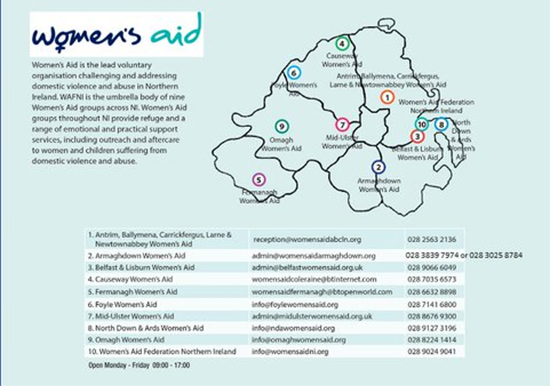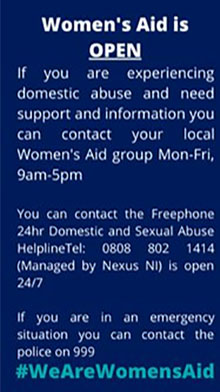Women’s Aid welcomes the statement by Justice Minister, Naomi Long highlighting the ongoing work of her Department during Covid-19 and recognising the dangerous reality of living with domestic violence and abuse.
Minister Long said: “All too often, rather than being a haven, for those living with abusive partners or family members, home is a place of hurt and of fear”.

Women’s Aid services are open across the whole of NI with our nine local groups providing emergency accommodation, outreach and community-based support services while continuing to support significant numbers of children and young people within our services.
Creative ways of working have evolved through our emergency contingency plans which are in place to allow us to best meet the need of those women, children and young people experiencing domestic violence and abuse in NI.
Before the Corona virus, the domestic violence and abuse statistics in NI were high accounting for 16% of all crime and our local PSNI attending a domestic violence incident every 17 minutes.
Sonya McMullan, Women’s Aid regional Services Co-ordinator, said: “During Covid-19, there are increased household tensions due to forced co-existence, economic stress and worries about the virus which are all contributing factors to already stressed households, add domestic violence and abuse and it is an extremely dangerous family environment for women, children and young people. This environment is difficult to manage in relation to safety and risk assessment and Women’s Aid would focus on safety planning in key public messages and awareness during this time.
“Increase in both psychological and coercive and controlling behaviours are prevalent currently as well as all forms of domestic violence and abuse including financial, sexual and physical abuse. People now find themselves in lock down 24/7 within a reduced or small space and this can cause tension and anger.
“Many controlling patterns of behaviour can become worse or can become accelerated during this time. Women, children and young people, hear it, sense it and feel it.

“Women’s Aid have been extremely successful in finding new and innovative ways to continue to provide the vital specialised support to women, children and young people during Covid-19 and this is done in such a way to best meet the need of that women or women and children within the refuge and community and outreach setting.
“Women’s Aid staff are set up to work remotely within outreach and floating support and can provide the same level of support via web-based chats or telephone. New referrals are also made in this way and same level of risk assessment and continuous support will be provided.
“All our accommodation across NI is continuing to keep women, children and young people safe and supported with most of our accommodation full at this time. So many women, children and young people are still living within communal spaces which causes difficulty in relation to social distancing and isolation periods. Women’s Aid have adapted these spaces as best they can to maintain good health and safety and to follow Covid-19 Guidance.”

Sonya added: “We have three crash pads located throughout NI to allow for emergency 48-hour accommodation and these were used over the weekend, where home was not a safe place for several families.
“The Crash Pads are for very high risk PSNI referrals, and if secure additional units become available, we will open it up further, however at this time the Crash Pads are for high-risk cases. It is important that after the 48-hour period appropriate accommodation is found.
“It is essential if other forms of accommodation are found to house women or women and their children during Covid-19 that they are linked in immediately with a Women’s Aid specialised support worker to facilitate their stay, and provide all the information and practical support needed during this time.
“We are working closely with partner agencies, including PSNI, NIHE through DfC and other statutory and voluntary partners to look at emergency provision for housing in NI. We need to think creatively about how we can best accommodate women and children safely when home is not a safe place for them due to violence and abuse in the home.
“There is concern of heightened risk as these weeks of isolation and containment increase. Domestic violence is already the leading cause of homelessness in the UK and it is key to get pathways in place and housing stock allocated and ready as soon as possible.”
Women’s Aid across NI is calling for a community and societal response to domestic violence and abuse during this pandemic. Women can check in with their friends, family, neighbours and colleagues, use WhatsApp, non-voice calls, as the phone is not a safe way to communicate for many. Everyone has a responsibility and could ultimately save a life.
“We need to break down the isolation, the perpetrator wants to establish. Perpetrator’s thrive on isolation and lockdown. We need family, friends etc. to be reactive and vigilant and know where and how to get support. Be on the lookout for abusive behaviours.
“Check in with those you know, or suspect could be living with an abuser and let them know you are there, you care, and you can help them when the time is right. As confinement goes on danger will intensify and women, children and young people may die,” Sonya said.
Women’s Aid across Northern Ireland is made up of nine local groups and Women’s Aid Federation NI. Women’s Aid is the lead agency tackling domestic violence with over 40 years’ experience of providing support. Women’s Aid are continually working together to understand the impact COVID 19 is having on women and children experiencing domestic violence and abuse and their service provision.
If you, or someone you know, are experiencing abuse, please visit the Women’s Aid information and support page, where you can access support from national online and telephone services or connect with a local service:
In an emergency, call 999.
On behalf of:
Rosemary Magill, CEO, ABCLN Women’s Aid
Eileen Murphy, CEO, ArmaghDown Women’s Aid
Kelly Andrews, CEO, Belfast & Lisburn Women’s Aid
Sharon Burnett, CEO, Causeway Women’s Aid
Mary McCann, CEO, Fermanagh Women’s Aid
Marie Brown, CEO, Foyle Women’s Aid
Martina Watson, CEO, Mid-Ulster Women’s Aid
Edel Fox, CEO, Omagh Women’s Aid
Beth Scott, CEO, North Down & Ards Women’s Aid
Sarah Mason, CEO, Women’s Aid Federation NI

























